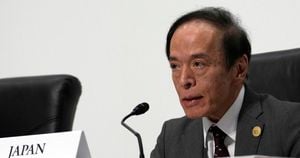President Donald Trump has ordered the declassification and public release of all federal records concerning the assassinations of former President John F. Kennedy, former Senator Robert F. Kennedy, and civil rights leader Reverend Dr. Martin Luther King Jr. This executive order, which was signed on January 23, 2025, is intended to promote transparency and fulfill the public's interest, especially for the families of the deceased, who have long sought clarity about these historic tragedies.
Trump emphasized the importance of transparency, stating, "The families and the American people deserve transparency and truth. It is in the national interest to finally release all records related to these assassinations without delay." This sentiment echoes the calls for openness surrounding the events of the 1960s, which have remained topics of significant speculation and concern for decades.
The President John F. Kennedy Assassination Records Collection Act of 1992 mandated the full disclosure of records related to JFK's assassination by October 26, 2017. Unfortunately, only fragments of those documents were released, leaving many details hidden. While the act allowed for some exceptions—if continuing secrecy could be proved to protect military, intelligence, or law enforcement interests—this executive order demands all remaining information to be reviewed and disclosed.
The public's intrigue surrounding the assassinations persists. According to polls, many Americans have long believed there was more to the stories than what was officially presented. For example, a Gallup survey conducted during the 50th anniversary of JFK's assassination found around 61% of Americans felt Lee Harvey Oswald did not act alone. The shadows of doubt cast over these historical events have resulted in considerable public skepticism.
While the precise number of documents related to RFK and MLK's assassinations is still unclear, experts estimate between 3,000 and 4,000 documents related to JFK’s assassination are expected to be released. The review process for these records is expected to be thorough, with the Director of National Intelligence and the Attorney General working to present a comprehensive plan for declassification.
Speculation about what the newly released documents might reveal is rife, though experts like investigative journalist Gerald Posner advise caution. Posner, who has extensively studied the JFK assassination, mentioned, “Anybody waiting for a smoking gun that's going to turn this case upside down will be sorely disappointed.” This advisement highlights the potential for disappointment among those hoping for groundbreaking revelations or shifts in the established historical narrative.
Historically, only about 3% of assassination records remained classified as of 2022, according to reports from NBC News. Despite millions of pages being made available to the public, the few documents yet to be released pertain to sensitive intelligence matters. Past document releases have included previously unknown details, such as a CIA agent surveilling Oswald’s mail one year prior to the assassination of JFK.
Robert F. Kennedy Jr., the son of RFK and Trump’s nominee for Health and Human Services secretary, has been vocal about his beliefs surrounding his uncle’s death. He posits the CIA's involvement and claims there is “convincing” but circumstantial evidence implicates the agency, reflecting broader suspicions surrounding the federal government's role during these tumultuous times.
Overall, the release of these documents, expected to take up to 60 days but possibly expedited, may finally provide some answers to the families and the public. The significance of transparency cannot be overstated; the assassinations of JFK, RFK, and MLK were pivotal moments in American history, and continued efforts to obscure their true nature perpetuates distrust.
Moving forward, transparency about these events may help heal historical wounds and support discussion about the nation’s past. The commitment to releasing these records could lead to eventual closure for the families of the slain leaders and contribute toward restoring public faith in governmental processes and historical accounts.



